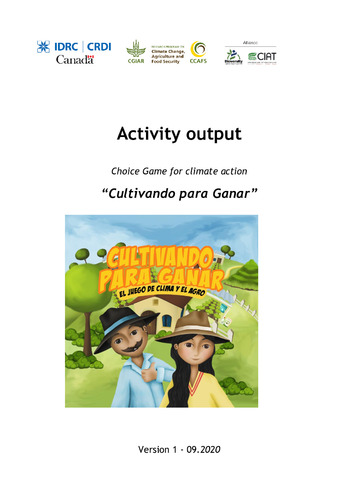Cultivando para Ganar - Choice Game for climate action
Smallholders are decision-makers with goals and strategies. Their decisions and behaviors towards the adaptation of climate-smart agriculture (CSA) options depend on individual livelihood goals, beliefs concerning the likelihood of uncertain climate events, and personal motives. Understanding the decision-making of farmers about the adoption of CSA practices and technologies to increase farming resilience against climate risks, which are embedded in many other risks, is a difficult task. Innovative approaches in action research, such as playing games, can generate a neutral environment to experiment and learn from simulated circumstances and outcomes and increase actors' awareness and capacity to plan the implementation of gender-sensitive CSA options properly. We developed and tested a choice game to understand and strengthen farmers' decision-making to implement (or not) CSA options after having received a seasonal climate forecast. The game was co-designed with CCAFS project partners in the Climate-Smart Villages of Olopa, Guatemala, and Santa-Rita, Honduras, and tested with farmers and extension in both countries. The game can be played in two settings, i) as a board game in a room where all players are present, and ii) as a virtual game where participants are connected through a video conference and accessing a shared document. Results provided general insights into farmers' perception of climate risks and the need and opportunities to proactively cope with them by implementing CSA practices. They were, however, hardly capable of developing strategies to do this in an economically reasonable way, and tried to implement as many strategies as possible. When playing the game in a virtual setting, agricultural experts and stakeholders from local institutions found the game to be an exciting tool to complement traditional learning methods in several ways. First, learning is promoted through the experience of the players. Also, the context of the game forms a safe learning environment for testing alternative decisions. Besides, discussion among players about the game outcome can be stimulating for real-world situations associated with adopting CSA practices. Simulation games can also make players aware of their mental models and potentially change these models or beliefs. Overall, the game is a useful tool for researchers to understand players' perceptions about climate risks, seasonal weather forecasts, and climate-smart agriculture options to cope with risks. For national stakeholder experts and development practitioners, it is a practical tool to be used in action research to complement other learning approaches, especially in low literacy communities.

